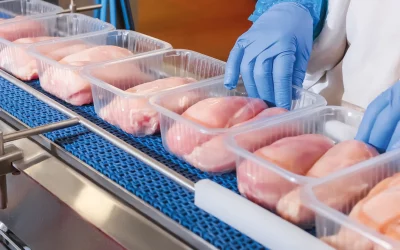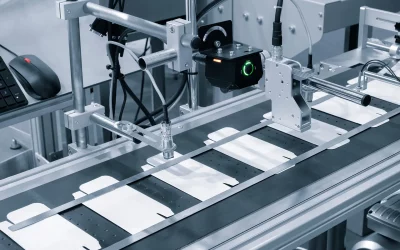1. Sustainable business practices
With climate change, carbon emissions and environmental degradation now at the forefront of consumers’ and politicians’ minds, the food industry is embracing sustainable practices in a big way.
Whilst sustainability has been on the agenda of the food industry for several years, expect 2022 to be the year that it reaches the top of the industry ‘to do’ list.
This is largely because sustainability has moved from being an optional extra, to near enough mandatory.
Thanks to consumer demand and government regulations, the food industry is having to scrutinise every part of its operations, from the sourcing of ingredients, to processing, packaging and transport, to find ways to make them more sustainable.
Considerable innovations are taking place in order to achieve this sustainability, with food manufacturers exploring things like new packaging materials such as biodegradable materials like cornstarch. Others are going so far as to invest in really innovative packaging materials such as edible bioplastics.
Aside from packaging, the most forward-thinking food manufacturers are introducing initiatives around food waste, energy efficient plant and equipment, intelligent distribution, sustainable sourcing, and longer-lasting equipment components, all as means of reducing their environmental footprint.
2. Plant-based foods
With the enormous environmental impact of meat and dairy consumption making headlines on an almost weekly basis, the food industry is exploring plant-based foods in a big way.
From plant-based milks, to soy-based meat-alternatives, the food industry is increasingly producing products that offer a genuine alternative to animal-based products.
The move towards more plant-based foods is not merely down to environmental concerns however. Since the Covid-19 pandemic, consumers have been increasingly seeking out healthier food choices.
With plant-based proteins being easier to digest, and with them providing a boost to the immune system, more and more people are willing to try plant-based foods. In fact, plant-based foods are increasing the number of people embracing a ‘flexitarian’ diet.
3. The rise of meal kits
Combining convenience with healthy ingredients, meal kits are set to be a major trend for the food industry in 2022.
Around one in five consumers have tried a meal kit, a number which is expected to increase as meal kit companies begin to offer a broader range of options ranging from traditional comfort foods to niche ethnic offerings.
Expect to see meal kit companies also offering more meals to cater to specific diets such as paleo, keto, gluten-free, vegan and more.
4. Food transparency
Consumers increasingly want to know where their food is sourced from.
Gone are the days when manufacturers could simply provide fairly anonymous lists of ingredients on their packaging.
Today, manufacturers are focusing on establishing a strong chain of custody for their ingredients, so they can provide detailed labelling and information on how their food has been produced.
You should also expect to see more detailed regulations around food transparency and labelling emerge from regulatory bodies such as the Food Standards Agency over the coming years to accommodate this trend.
5. Clean labels become the norm
2022 is set to be the year that clean labels go from being the exception, to the norm.
As consumers continue to focus on healthy diets, they’re seeking out foods that are free from additives, undesirable ingredients and that do not contain excessive amounts of salt, sugar and other ingredients that are prone to have a negative impact on health.
So expect to see manufacturers focusing on creating clean-label products that have a natural, healthy appearance in order to stimulate purchases.
6. Affordability
The first few months of 2022 have seen the cost of living increase across most of the world.
Due to rising energy prices, conflict-driven supply shortages and the after effects of the global Covid-19 lockdowns, consumers are becoming increasingly cost-conscious.
To give you an idea of the pressure on consumer budgets, consider the following statistic from the UN’s Food and Agriculture Organisation (FAO) – global food prices increased year on year by 28.1% in 2021.
Given the factors outlined above, prices are set to rise even more this year.
In order to mitigate these rising prices, 2022 is likely to see food manufacturers trying to make their supply chains shorter.
By reducing the distance between the source of ingredients, the manufacturer, and the end consumer, it is expected that the cost of food will be reduced.
7. Immunity boosting ingredients
Following the trauma of the Covid-19 pandemic, consumers have become more health-conscious than ever.
As a result, interest has risen dramatically in immunity-boosting, ‘functional’ foods. According to functional food manufacturer Beneo, an estimated 75% of consumers plan to eat and drink healthier as a result of the pandemic.
More specifically, interest has risen in immunity-boosting ingredients.
These are ingredients which go beyond simply providing nutrition, but also provide another health-related benefit. For example, microbiota included in fermented foods such as kefir, yoghurt can boost gut health. Other examples include ingredients like turmeric, honey, green tea extract, fish oil and ginger which can all be used to tackle inflammation.
Be at the forefront of the food industry with MRMK
As you have just read, there’s an enormous amount of change underway across the global food industry.
With companies being encouraged to be more sustainable and embrace developments such as food transparency, clean labels, affordability and more, it’s vital that every aspect of your operations are up to the job.
That’s where MRMK can help. Our long-lasting, highly durable machine blades can help you meet your sustainability goals by reducing blade replacement, improving uptime, reducing inefficiencies and more.
Speak to MRMK about your machine blade requirements today
For the latest food industry trends and machine blade developments, read the MRMK News and Insights hub…
Packaging Sustainability Trends for the Food Industry | Food Production Trends You Need to Know in 2022 | Choosing the Right Cutting Tools for Your Food Processing Operations


 +44 (0) 1909 519815
+44 (0) 1909 519815 


